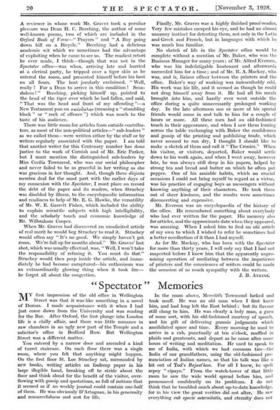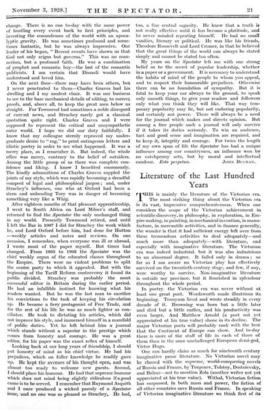" Spectator' Memories
MY first impression of the old office in Wellington Street was that it was like something in a novel of Dumas. I made acquaintance with it when I had just come down from the University and was reading for the Bar. After Oxford, the first plunge into London life is a chilly affair, and there was little romance in raw chambers in an ugly new part of the Temple and a solicitor's office in Bedford Row. But Wellington Street was a different matter.
You entered by a narrow door and ascended a kind of turret staircase. On each floor there was a single room, where you felt that anything might happen. On the first floor St. Loe Strachey sat, surrounded by new books, writing articles on foolscap paper in his large illegible hand, breaking off to stride about the floor and think aloud for the benefit of the visitor, over- flowing with gossip and quotations, so full of notions that it seemed as if no weekly journal could contain one-half o f them. He was obviously D'Artagnan, in his generosity and resourcefulness and zest for life. In the room above, Meredith Townsend lurked and took snuff. He was an old man when I first knew him, and had long left the East behind ; but its flavour still clung to him. He was clearly a holy man, a guru of some sort, with his old-fashioned courtesy of speech, and his gift of delivering gnomic judgments which annihilated space and time. Every morning he used to arrive in a cab, punctually at ten o'clock, muffled in plaids and greatcoats, and depart as he came after some hours of writing and meditation. He used to speak to me of India, with which we had common ties—the India of our grandfathers, using the old-fashioned pro- nunciation of Indian names, so that his talk was like a bit out of Tod's Raj ast'han. For all I knew, he spelt sepoy " cipaye." From the watch-tower of that little room he saw the wide world spread before him, and pronounced 'confidently on its problems. I do not think that he troubled much about up-to-date knowledge, for in his view the great verities did not alter. He saw everything sub specie aeternitatis, and eternity does not change. There is no one to-day with the same power of hustling every event back to first principles, and investing the conundrums of the world with an apoca- lyptic gravity. He was sometimes profound and some- times fantastic, but he was always impressive. One leader of his began, "Recent events have shown us that God not only reigns but governs." This was no man- nerism, but a profound faith. He was a combination of prophet and romantic boy—the last of the romantic publicists. I am certain that Disraeli would have understood and loved him.
On the next floor—there may have been others, but I never penetrated to them—Charles Graves had his dwelling and I my modest chair. It was our business to see to the base mechanical details of editing, to correct proofs, and, above all, to keep the great men below us straight. For Townsend had sometimes a noble disregard of current news, and Strachey rarely got a classical quotation quite right. Charles Graves and I were supposed to represent the critical and unsympathetic outer world. I hope we did our duty faithfully. I know that my colleague sternly reproved my under- graduate desire to "rag," to print outrageous letters and idiotic poetry in order to see what happened. It was a merry place, as I remember it. But indeed, the whole office was merry, contrary to the belief of outsiders. Among the little group of us there was complete con- fidence and liking. I know I benefited enormously. The kindly admonitions of Charles Graves suppled the joints of my style, which was rapidly becoming a dreadful compost of legal and philosophical jargon ; and, under Strachey's influence, one who at Oxford had been a stern and unbending Tory was in danger of becoming something very like a Whig.
After eighteen months of that pleasant apprenticeship, I went to South Africa on Lord Milner's staff, and returned to find the 'Spectator the only unchanged thing in my world. Presently Townsend retired, and until I left the Bar in 1907 I did for Strachey the work which he, and Lord Oxford before him, had done for Hutton —weekly articles and notes and reviews. On one occasion, I remember, when everyone was ill or abroad, I wrote most of the paper myself. But times had changed. From 1895 to 1903 the Spectator was the chief weekly organ of the educated classes throughout the Empire. There were no violent problems to split the centre party to which it appealed. But with the beginning of the Tariff Reform controversy it found its public divided. Strachey was probably the most successful editor in Britain during the earlier period. He had an infallible instinct for knowing what his readers wanted. But he was the last man to sacrifice his convictions to the task of keeping his circulation up. He became a fiery protagonist of Free Trade, and for the rest of his life he was as much fighter as con- ciliator. He took to dictating his articles, which did not improve his style, and immersed himself in a manifold of public duties. Yet he left behind him a journal which stands without a superior in the prestige which comes from honesty and courage. He was a great editor, for his paper was the exact reflex of himself.
Looking back at our long years of friendship, I should put honesty of mind as his chief virtue. He had his prejudices, which on fuller knowledge he readily gave up. He kept the avenues of his thought open, and was almost too ready to welcome new guests. Second, I should place his humour. He had that supreme humour which does not mind being slightly ridiculous if a good cause is to be served. I remember that Raymond Asquith and I once produced a wicked parody of a Spectator issue, and no one was so pleased as Strachey.. He had, too, a fine central sagacity. He knew that a truth is not really effective until it has become a platitude, and he never minded repeating himself. He had no small vanities, literary or political. He was like his friends, Theodore Roosevelt and Lord Cromer, in that he believed that the great things of the world can always be stated simply and cannot be stated too often.
My years on the Spectator left me with one strong belief as to the secret of popular leadership, whether in a paper or a government. It is necessary to understand the habits of mind of the people to whom you appeal, and to respect their honourable prejudices. Otherwise there can be no foundation of sympathy. But it is fatal to keep your ear always to the ground, to speak only smooth things, to give your readers and followers only what you think they will like. That way tem- porary popularity may lie, but not enduring popularity, and certainly not power. There will always be a need for the journal which makes and directs opinion. But among a free people such a journal will only survive if it takes its duties seriously. To win an audience, tact and good sense and imagination are required, and to keep it, integrity and courage. For twice the length of my own span of life the Spectator has had a unique influence among our countrymen, an influence won by no catchpenny arts, but by moral and intellectual



















































































































 Previous page
Previous page